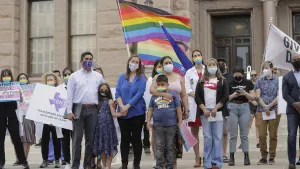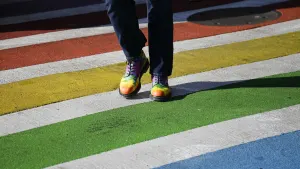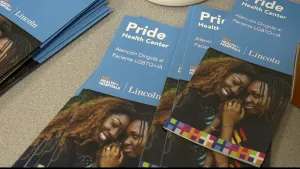More Stories
June is Pride Month and while
thousands will celebrate during the popular 'Pride March' in New York City,
some members of the LGBTQ community are speaking out against the parade
organizers.
In May, Pride March organizers announced
they would no longer allow police officers to host exhibitions or participate
in the event while in uniform.
Organizers say the decision is partly based on some members of the LGBTQ+ community's discomfort and even fear of police
in uniform, saying, in part, they're "unwilling to
contribute in any way to creating an atmosphere of fear or harm for members of
the community.”
Melissa Diniz is an 11-year veteran of the New
Rochelle police force, a mom, and a part of the LGBTQ+ community.
Diniz serves as a youth police detective protecting the
community where she grew up. Her focus is preventing juvenile crime by
interacting with young people and their families. "There's ones where it's just
one and done and there's sort of like a satisfaction where, you know, that the
kid needs a little bit more help. And it can be challenging, but it means a lot
to me to be able to help the ones who are a little bit more of a
challenge."
Detective
Diniz is also
an educator among her peers, serving as her department's LGBTQ+ liaison - a position she helped to create.
She conducts workshops to help fellow officers better understand the gay
community. "We talk about orientation and the right words to use.
And basically, I teach what matters police wise and what doesn't matter,"
says Diniz.
Diniz says her department has been open and
accepting to who she is and her ideas, but she now finds exclusion from some
members of her own community. "The inclusion of one group of people
makes the other group of people feel excluded. So you're just going to choose
which group to exclude, which in my mind just really doesn't
make sense. That's not the solution," explains Diniz. "You're
taking people who are making change, affecting change, educating cops, you know,
and you're saying that we can't do something because we're cops…and you're
saying that I can march, but not in uniform. I'm still a cop, not in uniform."
Some in the LGBTQ+ community
tell News 12 that many are afraid to speak out about the
city’s decision because they are afraid
of backlash. Diniz says she actually felt more
supported by her brothers and sisters in blue than from her gay friends when
she decided to speak out. "All the things that I've done in my past make
me who I am. And being a cop also contributes to who I am… I'll never not be
proud to be a cop."
Diniz
says she has
no plans to take part in this year's parade or any pride events in the city.
More from News 12
3:00

be Well: Journey to parenthood for LGBTQ+ couples
1:24

Brooklyn shows love has no limits at the 28th annual Brooklyn Pride Twilight Parade
1:43

Flag-raising ceremony at Bronx Borough Hall kicks off Pride Month

Guide: LGBTQ resources and support groups
2:49

Guide: How to support local LGBTQ-owned and -friendly businesses
2:10
